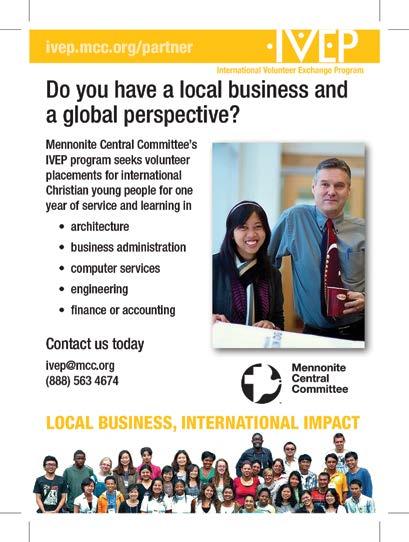
6 minute read
Soundbites
Measurement matters
All the good business leaders I know are maniacal about measuring things. They know their sales data and customer satisfaction numbers, which divisions of their company are beating expectations and which are lagging behind. Some even analyze their calendars to make sure they’re spending time on the right priorities. (I admit I’m one of those.)
Measurement is a big part of mobilizing for impact. You set a goal, and then you use data to make sure you’re making progress toward it. This is crucial in business — and it’s just as important in the fight against poverty and disease.... If you want a better world, you need to constantly take stock. — Microsoft founder Bill Gates, co-chair of the Bill & Melinda Gates Foundation, in Time
Changed wallets
When you see hearts that are changed and you see wallets that are changed, you really can see communities transformed. — Peter Greer, coauthor, The Poor Will Be Glad
God of leisure?
It is bemusing and sometimes saddening to see where people think they find God. They act as if God must be hiding among the forests of a national park or between the gunwales of a canoe. Someone claimed to find God best at a U2 concert. Pity the poor
Tarnished brands?
What can the church learn from business, or vice-versa?
Plenty, says historian Diana Butler Bass, owing to the many things they have in common. For one thing, American churches and 20th century corporations were organized on similar principles and structures, she writes in Christianity After Religion: The End of Church and the Birth of a New Spiritual Awakening. “Beginning around 1890, denominations built massive bureaucratic structures, modeling themselves after American businesses, complete with corporate headquarters, program divisions, professional development and marketing departments, franchises (parish churches), training centers, and career tracks. Other than the fact that denominations offered religion as the product, they differed little from other corporations that dominated America in the last century.”
While corporations have gone through tough times and suffered image problems, so too has organized religion, she says. “The religious model that once worked so well serving to educate, spiritually enliven, and socially elevate so many does not accommodate those goals as well any longer. As with other corporations of the same vintage, church executives became too distanced from the regular folks; managers (i.e., pastors) grumbled about pay, benefits, and working conditions; creativity was strangled by red tape; expenses began to outrun income; and huge facilities needed to be maintained. Faith increasingly became a commodity and membership roles and money the measures of success. The business of church replaced the mission of the church. Slowly, then more quickly, customers became disgruntled. Resources declined. Brand loyalty eroded.” ◆
who cannot afford a trip to the mountains or a ticket to hear Bono, tempted as we all are to embrace celebrity as authority when its views coincide with ours. If you can’t find God in the madness of the city or the frenzy of daily toil, it’s because you haven’t looked. — Haitian philosopher B. Boku
It’s spelled j-o-b-s
The biblical way to help people rise out of poverty is through wealth creation, not wealth redistribution. For lasting results, we must offer the poor a hand up, not merely a handout. You spell long-term poverty reduction “j-o-b-s.” Training and tools liberate people. Trade, not aid, builds the prosperity of nations. — California pastor Rick Warren in the Foreword to The Poverty of Nations: A Sustainable Solution
Limited charity
Charity has never helped any country escape underdevelopment. — Former Haitian president Rene Preval
Climate what?
If you talk to farmers they’ll say, “Well, my ponds are drying up, my animals have more heat stress, and I’m planting two weeks earlier.” They’re saying all the right things, but they can’t spit out “climate change” because it’s been politically tainted. — Charles Rice, soil science professor at Kansas State University, in USA Today
Your ego or mine?
Most assume a Wall Street investment banker would have a bigger ego than a humanitarian aid worker in Africa. But I have been around do-gooders
my entire life — and am one — so I know there’s a desire to be seen as the hero in all of us. — Peter Greer in The Spiritual Danger of Doing Good
Company town
How to describe Rochester, Minnesota? It is essentially cancer town. There is one massive hospital complex called the Mayo Clinic, the thirty thousand people who work there, and everything else in the town exist either to support or supply it.... It is kindness incarnate, almost frighteningly so. Everyone knows that everyone who
Letters
Don’t forget urban shalom
I appreciate the many fine, stimulating articles in The Marketplace. It is a timely and important magazine.
But I must take issue with the Soul Enterprise column “Down on the farm” in the Sept-Oct 2013 issue. The first line is misleading, “The Bible begins and ends in the garden (farm?).” While it is true that the Bible uses many horticultural images and we are told from cover to cover to be good stewards of creation, the Bible clearly ends not in a garden but a city. Good stewardship must include also another form of creation — the human community. As human communities grow they become villages, towns, and ultimately cities. Can we learn to be good stewards of those creations as well?
As a farm boy transplanted to the city, I have deep appreciation for the soil and all things green. In the city we are learning that rooftop gardening, the greening of urban brownfields, and other forms of urban gardening are all important aspects of sustainability. In fact, with over half the world’s population now living in urbanized places we must include urban sustainability in our life cycles if the planet is to endure. The author rightly points out that even in exile the Israelites were to plant gardens and eat what they produced, but fails to point out more importantly that they were to intercede earnestly for the shalom of the city they were exiled in (Jer. 29:7). Only in the shalom of Babylon would they find their own shalom.
In tracing the movement from Eden to the New Jerusalem in our scriptures, eminent Christian urbanist Ray Bakke likes to quip, “You have an urban future, whether you like it or not!” How should we and our neighbors prepare for that? — Freeman J. Miller, Philadelphia

comes there is finding out if they’re sick, already sick, getting better from being sick, or too sick and will probably die. The whole town is like one palliative care unit. The waitresses are grief counselors. They serve you hamburgers and hold your hand as you weep for your son, daughter, mother, father, wife, or husband. All the sales people, the street cleaners, the airport shuttle drivers have an eye out for the wounded. — Eve Ensler in In the Body of the World: A Memoir
Me, successful?
How to define success, being rewarded for our efforts, is a vexing question for entrepreneurs. Can a person be viewed as successful if they have built a flourishing company but have bred a dysfunctional family? — Richard J. Goossen and R. Paul Stevens in Entrepreneurial Leadership: Finding Your Calling, Making a Difference


